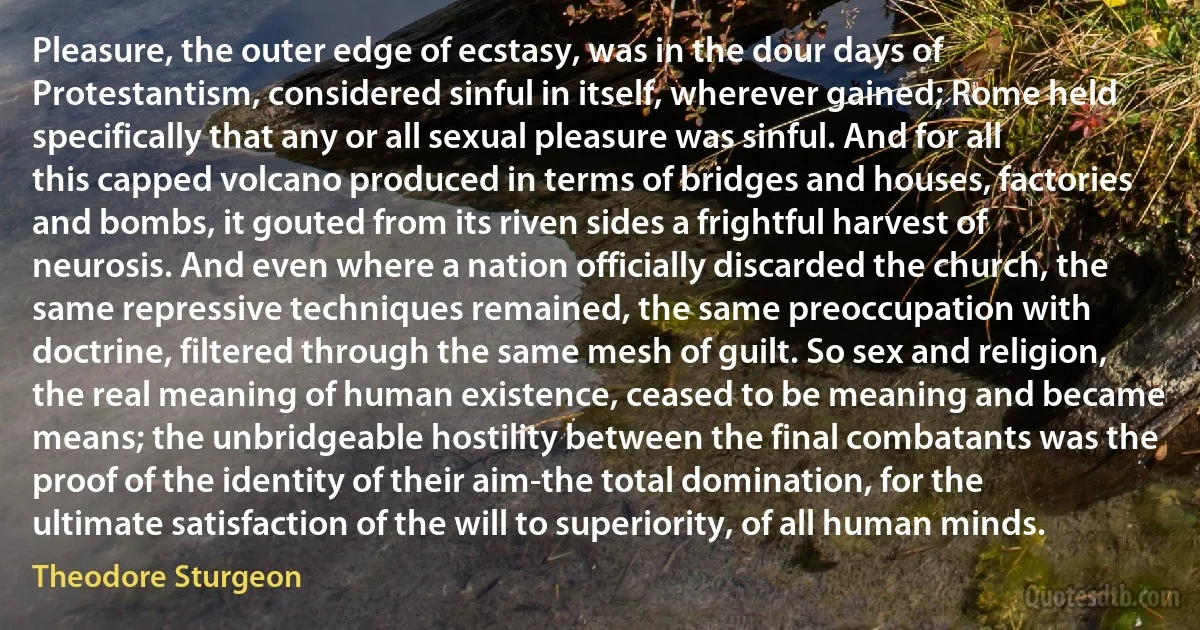
Pleasure, the outer edge of ecstasy, was in the dour days of Protestantism, considered sinful in itself, wherever gained; Rome held specifically that any or all sexual pleasure was sinful. And for all this capped volcano produced in terms of bridges and houses, factories and bombs, it gouted from its riven sides a frightful harvest of neurosis. And even where a nation officially discarded the church, the same repressive techniques remained, the same preoccupation with doctrine, filtered through the same mesh of guilt. So sex and religion, the real meaning of human existence, ceased to be meaning and became means; the unbridgeable hostility between the final combatants was the proof of the identity of their aim-the total domination, for the ultimate satisfaction of the will to superiority, of all human minds.
Theodore SturgeonRelated topics
cap church doctrine domination ecstasy edge final guilt harvest hold human meaning nation neurosis pleasure preoccupation proof protestantism real religion ultimate means rome daysRelated quotes
WHAT HAPPENS AFTER DEATH?
When a human soul goes out of the body, some great mystery happens. For if it is guilty of sins, then there come hordes of demons, evil angels and dark forces, take that soul and drag it to their side.
No one should be surprised at that, because if a man surrendered and fell prey to them while still alive in this world, will not they have even greater control over him and enslave him when he departs from this world?
As for the other, the better part of people, something different happens to them. There are Angels around the holy servants of God in this life; the holy spirits surround them and protect them; and when their souls are separated from the body, the choir of Angels welcomes them into their fellowship, into a bright life, and thus leads them to the Lord.

Macarius of Egypt
This new kind of war, this contest between the benefits of two ways of life, may foreshadow the nature of the final world struggle between the democracies and communism. Perhaps both sides, with the frightening instruments of total destruction in their hands, may decide that these terrible weapons must never be used. I pray fervently that this be true, not only because of the lives that would be saved, but also because I know America can reap a greater harvest from peace than can her enemies. But peace will be granted us only if we are strong, if the Russians and their followers know we are strong and if they are convinced that we have the determination and courage to use that strength to achieve a military victory the next time we are called to war against communism.

Mark W. Clark
In the ultimate matter of life and death, survival or defeat, the insular position of the British nation has set us apart from the inhabitants of the adjacent continent. This is a political fact which cannot be pretended out of existence. As long as it remains true, or is believed by the British themselves to remain true, the commitment of Britain to any continental combination can never be total. ... True, it has often been rumoured that Britain had lost, or was about to lose, that characteristic; but events have hitherto always proved that she had it still, and those events are the most formative element in the folk-memory of the British people. ... This is the reason why Britain, which is in many sense as European as any nation, cannot be integrated politically with the European continent.

Enoch Powell
I dwell on this prospect with every satisfaction which an ardent love for my Country can inspire: since there is no truth more thoroughly established, than that there exists in the oeconomy and course of nature, an indissoluble union between virtue and happiness, between duty and advantage, between the genuine maxims of an honest and magnanimous policy, and the solid rewards of public prosperity and felicity: Since we ought to be no less persuaded that the propitious smiles of Heaven, can never be expected on a nation that disregards the eternal rules of order and right, which Heaven itself has ordained: And since the preservation of the sacred fire of liberty, and the destiny of the Republican model of Government, are justly considered as deeply, perhaps as finally staked, on the experiment entrusted to the hands of the American people.

George Washington
The creationist is a sham religious person who, curiously, has no true sense of religion. In the language of religion, it is the facts we observe in the world around us that must be seen to constitute the words of God. Documents, whether the Bible, Qur'an or those writings that held such force for Velikovsky, are only the words of men. To prefer the words of men to those of God is what one can mean by blasphemy. This, we think, is the instinctive point of view of most scientists who, curiously again, have a deeper understanding of the real nature of religion than have the many who delude themselves into a frenzied belief in the words, often the meaningless words, of men. Indeed, the lesser the meaning, the greater the frenzy, in something like inverse proportion.

Fred Hoyle
